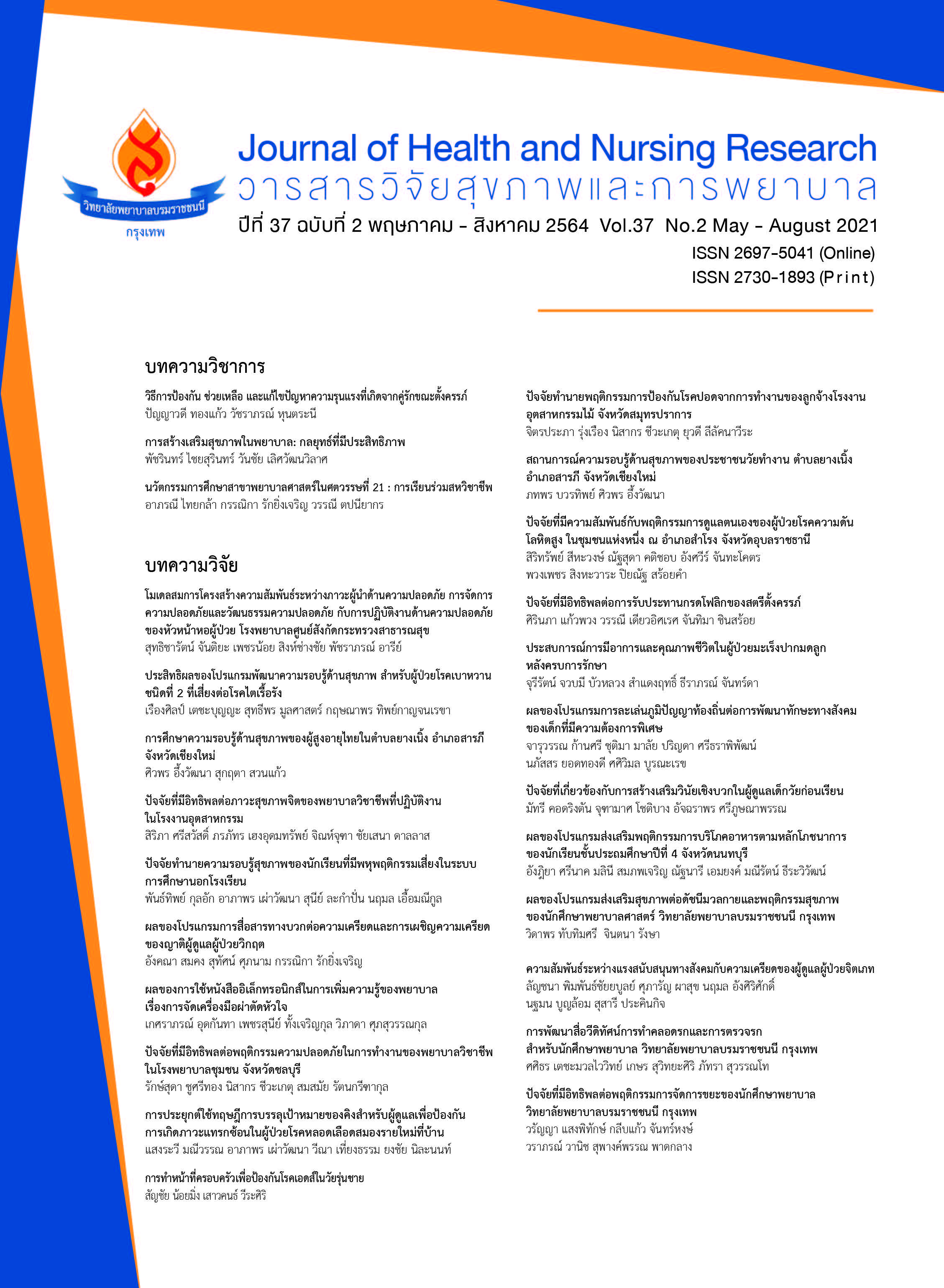ผลของโปรแกรมส่งเสริมพฤติกรรมการบริโภคอาหารตามหลักโภชนาการ ของนักเรียนชั้นประถมศึกษาปีที่ 4 จังหวัดนนทบุรี
คำสำคัญ:
พฤติกรรมการบริโภคอาหาร, ทฤษฎีปัญญาสังคม, นักเรียนชั้นประถมศึกษาบทคัดย่อ
การวิจัยกึ่งทดลองนี้มีวัตถุประสงค์เพื่อศึกษาผลของโปรแกรมส่งเสริมพฤติกรรมการบริโภคอาหารตามหลักโภชนาการของนักเรียนชั้นประถมศึกษาปีที่ 4 กลุ่มตัวอย่างเป็นนักเรียนชั้นประถมศึกษาปีที่ 4 ของโรงเรียนแห่งหนึ่งในจังหวัดนนทบุรี จำนวน 61 คน แบ่งเป็น กลุ่มทดลอง 31 คน และกลุ่มเปรียบเทียบ 30 คน กลุ่มทดลองได้รับการจัดกิจกรรมการเรียนรู้ตามโปรแกรมส่งเสริมพฤติกรรมการบริโภคอาหารตามหลักโภชนาการของนักเรียนชั้นประถมศึกษาปีที่ 4 โดยประยุกต์แนวคิดทฤษฎีปัญญาสังคม เป็นเวลา 8 สัปดาห์ ประกอบด้วย การสร้างเสริมความรู้โดยการบรรยายประกอบสไลด์และสื่อวีดิทัศน์ การทำกิจกรรมกลุ่ม การนำเสนอและการอภิปรายกลุ่ม การฝึกปฏิบัติการเลือกอาหารและการประกอบอาหารด้วยตนเอง การแสดงบทบาทสมมติ การเรียนรู้จากตัวแบบจริงและตัวแบบสัญลักษณ์ การเขียนเรียงความ การวาดภาพ การได้รับคำชมเชยและแรงจูงใจจากผู้วิจัย และการใช้สมุดกิจกรรมสื่อสารกับผู้ปกครอง การเก็บข้อมูลก่อนและหลังการทดลองด้วยแบบสอบถาม การวิเคราะห์ข้อมูลด้วยสถิติ ความถี่ ร้อยละ ค่าเฉลี่ย ส่วนเบี่ยงเบนมาตรฐาน Paired Samples t-test และ Independent Samples t-test
ผลการศึกษาพบว่า กลุ่มทดลองมีความคาดหวังในผลลัพธ์ต่อการบริโภคอาหารตามหลักโภชนาการ และพฤติกรรมการบริโภคอาหารตามหลักโภชนาการ สูงกว่าก่อนการทดลอง และสูงกว่ากลุ่มเปรียบเทียบอย่างมีนัยสำคัญทางสถิติ (p<0.05)
สรุปได้ว่า โปรแกรมส่งเสริมพฤติกรรมการบริโภคอาหารตามหลักโภชนาการของนักเรียนชั้นประถมศึกษาปีที่ 4 มีการเปลี่ยนแปลงความคาดหวังในผลลัพธ์ต่อการบริโภคอาหารตามหลักโภชนาการ และพฤติกรรมการบริโภคอาหารตามหลักโภชนาการถูกต้องมากขึ้น จึงสามารถนำโปรแกรมนี้ไปประยุกต์กับเด็กวัยเรียนกลุ่มอื่นที่มีบริบทใกล้เคียงกัน เพื่อส่งเสริมให้นักเรียนมีพฤติกรรมการบริโภคอาหารที่ถูกต้อง และมีสุขภาพร่างกายแข็งแรงได้
Downloads
เอกสารอ้างอิง
World Health Organization. Obesity: Preventing and Managing the Global Epidemic, Report of a WHO Consultation. Geneva: WHO; 2010.
Institute for Population and Social Research, Mahidol University. Thailand Health 2014: Local communities manage themselves to reform the country from the foundation. Nakhon Phatom: Amarin Printing and Publishing; 2014. (in Thai)
Bureau of Nutrition, Department of Health, Ministry of Health. Prevention of Students Overweight. Nonthaburi: The War Veterans Organization of Thailand; 2014. (in Thai)
Mosuwan L. The 4th Thai Health Survey Report by Body Survey 2008-9. Nonthaburi: The Graphico System. Limited; 2009. (in Thai)
Peungposop N. Study of risk factors affecting overnutrition among school children in Bangkok.
[doctoral’s thesis]. Bangkok: Chulalongkorn University; 2009. (in Thai)
Aree P. Nutrition status Food Consumption and Physical Activity in Adolescents: a Pilot Study. Nursing Journal 2007; 34(2):98-105. (in Thai)
Wichidist S. Eat healthy, Nutrition problems in adolescents, the dangers of losing weight in teens. Bangkok: Prayunwong printing; 1998. (in Thai)
Chaiyasung P, Yakasem P, Chuthongrat N. Factors predicting food consumption behaviors of overweight elementary school students, grade 4-6.The Journal of Boromarajonani College of Nursing, Nakhon Ratchasima 2014;20(1):30-43. (in Thai)
Choojan S, Thongbai W, Kummabut J. The effects of self-efficacy and family support promotion program on consumption behavior among late school aged children with overweight. The Journal of Boromarajonani College of Nursing, Bangkok 2016;32(1):31-43. (in Thai)
Quick V, Martin-Biggers J, Povis GA, et al. Long-term follow-up effects of the home styles randomized controlled trial in families with preschool children on social cognitive theory constructs associated with physical activity cognition and behaviors. Contemporary Clinical Trial 2018;68(1):79-89.
Pbert L, Druker S, Barton B, et al. A school-based program for overweight and obese adolescents: a randomized controlled Trial. Journal of School Health 2016;86(10):699-708.
Bureau of Health Promotion, Department of Health, Ministry of Health. Health Promotion School Operation Manual (Revised edition 2015). Bangkok: The Office of Silpakorn University Academic Services; 2017. (in Thai)
Branscum P, Sharma M, Wang L, et al. A Process Evaluation of a Social Cognitive Theory-Based Childhood Obesity Prevention Intervention: the comics for health program. Health Promotion Practice 2013;14(2):189-98.
Chia-Liang Dai & Manoj Sharma. Predicting childhood obesity prevention behaviors using social cognitive theory for elementary school students in Taiwan. International Journal of Health Promotion and Education 2014;52(6):339-45.
Ahmadi Z, Pirzadeh A, Hasanzadeh A, Mostafavi F. The Effect of a Social Cognitive theory-Based Intervention on Fast Food Consumption among Students. Iran J Psychiatry Behav Sci 2018;12(2):1-5.
Fleiss JL. Statistical Method for rate and proportion. 2ndEdition. New York: John Willey & Sons;1981.
Sansing V, Leerapan P, Kengganpanich T, Termsirikulchai L.Effect of A Diet Control Program among
Overweight Prathomsuksa 5-6.Thai Journal of Health Education 2013; 36(124):76-88. (in Thai)
Kaewtes V. Effects of dietary and physical activity behaviors promotion program for overweight students in Bangkok metropolitan school. [master’s thesis] Bangkok: Mahidol University; 2013. (in Thai)
Tuntiakarat S, Thongbai W, Takviriyanun N. The effectiveness of obesity prevention program on eating and physical activity behaviors among overweight school-aged children. The Journal of Boromarajonani College of Nursing, Bangkok 2015;31(3):47-61. (in Thai)
Bloom BS, Hastings JT, Madaus GF. Handbook on formative and summative evaluation of student learning. New York: McGraw-Hill. 1971.
Roscoe JT. Fundamental research statistics for the behavioral sciences. New York: Holt Rinehart and Winston, Inc. 1975.
ดาวน์โหลด
เผยแพร่แล้ว
รูปแบบการอ้างอิง
ฉบับ
ประเภทบทความ
สัญญาอนุญาต
บทความที่ได้รับการตีพิมพ์ เป็นลิขสิทธิ์ของวารสารวิจัยสุขภาพและการพยาบาล (วิทยาลัยพยาบาลบรมราชชนนี กรุงเทพ) ไม่สามารถนำไปตีพิมพ์ซ้ำในวารสารฉบับอื่น


















